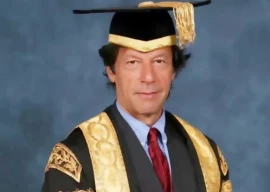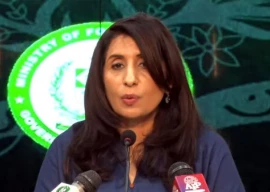
It was about a Pakistani mother upset by her children’s use of Hindi words. They had picked them up from television, whose cartoon channels carried Hindi programming. A Lahore teacher, the report quoted, said children in her class had begun to use vishaal, shanti, mukti and adhikaar in conversation.
This was apparently a very bad thing and some literary figures said in the report that Urdu programming was needed and that mothers should teach Urdu at home if they wanted to preserve their culture.
Cartoon Network, Pogo and the rest were available in English also, of course. However, according to a cable operator from Allama Iqbal Town also quoted in the story, Pakistani children preferred their cartoons in Hindi.
This is true of India also, where children — including those studying in English schools — watch their cartoons only in Hindi.
The reason I remembered this story is some work I do every week for firstpost.com, where I translate Saadat Hasan Manto’s nonfictional writing.
I was working on an essay where he describes one of his court cases. Manto is sent a notice by a Karachi magistrate and has to travel from Lahore to face the charges.
Manto and a friend set off by train armed with 15 bottles of beer (even I was taken aback by this number). The adventure begins and Manto packs off an old man going through his prayer beads and a woman in a burqa. The compartment is inappropriate for them, he says, and they flee.
At this point he writes, and this is the precise moment when I thought of the Hindi story, hum nishchint ho gaye (we became carefree).
Once Manto and his friend reach Karachi, they go to his brother-in-law’s house where hamari badi aao-bhagat ki (they looked after us very well).
I want to tell Pakistani children who use Hindi words that they are in excellent company.
Nishchint and aao-bhagat are not Urdu, if by Urdu is meant a language whose words are all taken from Farsi or Arabic. Of course, the truth is that Urdu is actually exactly the same language as Hindi if we look at its grammar (don’t tell Pakistani mothers this). Only the scripts are different. I know many literate Pakistanis who use Hindi words for their precision. Jang columnist Hassan Nisar, for example, is fond of the word satyanash. Nazir Naji is another who uses an easy Hindustani language, rather than a rigid Urdu.
Gandhi said all Indians must learn the Hindustani language in its Devnagari and Persian scripts.
Though it is not common for Indians to know Persian script, there are many I know who read it, and I’m not just referring to Muslims.
On the other hand, I know of only one Pakistani who can read Devnagari, the linguist Dr Tariq Rahman. I suspect my Pir-o-Murshid (who writes for this paper) is also familiar with it.
This is astonishing given how obsessed Pakistan is with India as a military and civilisational threat, but perhaps knowing Devnagari isn’t needed. Pakistanis need only switch on India’s news channels to know what’s going on because, like Lahore’s cartoon-watchers, they immediately connect with Hindi.
There’s nothing wrong or foreign about words like vishaal, shanti, mukti and adhikaar. Some of them have no parallel in either Persian or Arabic and are unique. In Gujarati, we use the word haq as easily as we do adhikaar and that’s as it should be. Being rigid about words, especially for the reason that they are thought to be corrupting, is just a waste of time.
Let me finish by telling a story written in Gujarati about a man who, like the Pakistani mothers, is worried about the enemy’s words in his language. The story is called Bhadrambhadra and the man, Daulat Shankar, resolves to speak only a pure Gujarati, but becomes a laughing stock instead.
The reason, and alert readers will have noticed this already, is that his first name is itself an Arabic word.
Published in The Express Tribune, January 6th, 2013.
COMMENTS (29)
Comments are moderated and generally will be posted if they are on-topic and not abusive.
For more information, please see our Comments FAQ



1721376111-0/BeFunky-collage-(15)1721376111-0-165x106.webp)








1725083820-0/Untitled-design-(24)1725083820-0-270x192.webp)






@gujranwala789: aab is the corruption of aap in Sanskrit which means water and is always used in plural. Paani is from Sanskrit Paaniyam which means water fit for drinking.
@Hukum Singh While your naration is based on Aryan Invasion Theory but there are lots of deviations. The homeland of so called aryans is still not pin pointed but most of scholars put the homeland somewhere near turky or russia. By no means it was Persia where the aryans originated. BTW the theory is still not accepted by all and as per many new historical evidences coming into picture it may not be true at all.
Also there are many indian languages which claim proximity to Sanskrit, the example you have given 'ast' is also used in marathi.
@Cynical:
You have summed it up so very well.This has been one of the finer & more educative discussions on ET. And I am grateful to all & to Aakarbhai. It is unbelievable that the fear of "contamination" is such that some would want to close down a programme or ban hearing of a foreign word lest sacrilege is committed by an ear, while the English are happy adding new words every year! http://www.bbc.co.uk/news/uk-politics-20309441
@John B @Hukum Singh @Zalmai
Your respective contributions on this page are acknowledged with a sense of gratitude. Its contributors like you who make the ET pages worth visiting. Thanks for taking the time and trouble.
To all those who are quibbling about use of Hindi words in spoken/written Urdu should look at the history of English language; very much a borrowing language, with an enormously disparate vocabulary. Borrowing from African to Arabic, from Polish to Persian and even as far as from Australian aboriginal sources English has immensely enriched itself to become a language spoken and/or understood by more than over a billion people today.
@Shakir Lakhani:
Because Indians aren't Arabs and prefer to use language of their ancestors and not the language imposed by invaders. And of course Pakistan has more Quraishis and Ansaris than Arabian peninsula itself.
@gujranwala789
"Vishal is azeem, shanti is sakoon/aman, mukti is nijaat, adhikaar is Haq, Nishchint is be-fikar, aoo-bhagat is Tawazoh in pakistani languages. There should be a ban on hindi dubbed Cartoon channel so that children do not pick up wrong words from this channel."
All the words you mentioned are either Arabic or Farsi. None of them are Pakistani languages per se. Gujranwala is not in Iran or Arabia it is in Punjab, which is India and South Asia therefore the Hindi words are native to where you belong not Farsi and Arabic.
@Hukum Singh
As a Pashtun and speaker of Pashto, I acknowledge that Pashto has Sanskrit infused in it and Afghan Pashtun scholars have reconciled this fact without prejudice or shame. People that are trying to connect language with religion are silly because religions came after language. Urdu grammar is entirely Hindi but the language itself has incorporated Farsi and Arabic along with some loan words from Turkic languages.
@John B
"The suggestions that Pashtu is closer to Sanskrit is incorrect as Pashtu is more of a dialect than a language, borrowing vocabularies of various civilizations that passed through the region retaining the Sanskrit, and Middle Persian linguistic structure later influenced by introduction of Arabic script."
Most languages especially Urdu is a dialect, which borrowed its entire language from Farsi and Arabic.
@Hukum Singh: You are partly correct on the linguistic history, partly correct on religious doctrine evolution, and incorrect in saying that Indo Aryan civilization came from ancient Persia.
There was no such thing as ancient Persia, and the Sanskrit speaking ancient ancestors of Indo-European (-Aryan ) stock came from the central Asia and split into Persia going and Indus going tribes. The Persia of ancient world was inhabited by Semitic origin people and of course the Aryan stock settled and mixed with Native Semitic cultures. The Persian Kingdom was formed much later.
All these things happened much earlier than 3000 BC.
The suggestions that Pashtu is closer to Sanskrit is incorrect as Pashtu is more of a dialect than a language, borrowing vocabularies of various civilizations that passed through the region retaining the Sanskrit, and Middle Persian linguistic structure later influenced by introduction of Arabic script.
@Hukum Singh
@abhi says, 'You have great fantacies!'
Please ignore his comment. Please don't dignify his crassness by responding to it. These trolls lack the intellectual rigor to participate in an academic discourse, being brought up in culture of one upmanship.
@abhi: It depends on the theme, if I just want to say someone to bring water then I will use paani but if I am talking about water and cimate of a region then I will use the word Aab-o-Hawa as it would be woefully absurd to say paani-o-hawa. Similarly when we talk about extract of some grain which is mostly water then again we will say Aab-e-XYZ thing. Both words paani and Aab are part of our muslim punjabi vocabulary.
@Hukum Singh
Quite an informative post. I didn't know the connection between Sanskrit and Pashto. Thanks.
@Hukum Singh:
The closest modern languages to sanskrit are dardic languages shina (spoken in gilgit), khowar and kalasha (spoken in chitral) in remote northern areas of pakistan, kashmiri language spoken in indian valley of kashmir called kashur language is also part of dardic languages and hence close to original sanksrit language but kashur language has absorbed a lot of punjabi and sindhi linguistic influences due to the history of kashmir valley. Pashto is directly descended from ancient Avesta language which was closest to rigvedic sanskrit as both of them descended from common proto indo-iranian ancestral language.
@Hukum Singh You have great fantasies! @gujranwala when you speak Punjabi, do you use Pani for water or Aab?
@FS: I said in pakistani languages which is not restricted to urdu only as it is just one language that is spoken in pakistan , I as a punjabi always use khatar tawazoh both when speaking punjabi or urdu and so do other people in my area. This misconception that as if Urdu is something that is the only language spoken in pakistan should be over now, most people in pakistan treat urdu only as a language to communicate to the people who speak other provincial languages as their mother language, there is no pride associated with speaking urdu language in most areas except karachi where it is spoken by most of the people as mother language and hence they are the ones who take pride in urdu. I as a punjabi do not have any emotional connection to urdu language , I take it just as a useful tool.
@gujranwala789: Gujranwalaji, Do you know which South Asian language is closest to mother of all Indian languages - Sanskrit? Answer is Pashto. All North Indians and Pakistanis have the same old Aryan blood and the language their ancestors spoke when they left ancient Persia in 1500 BC to come to India was Sanskrit (and Pashto and Sanskrit was the same at the time). No need to get your panties in a bunch for this.
Every Indian government has tried its best to replace Urdu words with Hindi words. Sometimes I can't understand some words that Amitabh Bachan uses in crorepati program. Cartoon Network (the Hindi version) not only used Sanskrit words but also showed Indian mythology and religious symbols, and it has now been banned (though unofficially). We were worried not about my grandchildren learning Hindi words but by the fear of them being brainwashed into believing that what they saw and heard about Hindu gods is true.
@kabir: What you call "Sanskrit Vocabulary" is actually Old Indo-Aryan/Afghan vocabulary. Sanskrit is nothing but Pashto from 1500 BC (of course without Turkic and Arabic words becasue those people had not reached India)
When Old Aryans in ancient Persia(including present Iran and Afghanistan) split, one tribe came to India. The Gods of one set of Aryans became demons of other set of Aryans. Indian Aryans called demons Asura which was the god of Persian Aryans- Ahura Mazda (Indian "S" being Irani "H" and Sindhu being Hindu) and vice-versa. The Aryans who came to India brought Sanskrit the mother of all Indian languages. Pashto is language closest to Sanskrit if you strip all Arabic words. An easy word "ast" is common to both Pashto and Sanskrit. Today, Pashto and Sanskrit are different because Pashto got lot of Turkic and Arabic and modern day Irani words while Sanskrit (which was only ceremonial language; not used in daily living) was kept in its old form by Brahmins. So people - no need to get your panties in a bunch over language. The ancestors of present North Indians were Afghans (from Old Persia) who came to India in 3000 BC- 1500 BC and mixed with Adivasi people who were natives here
@gujranwala789: aoo-bhagat is actually more common in Urdu then Khatir-Tawazoh.
What is the purpose of this article? There are some Indians like who only use pure Hindi with zero urdu. So what?
Pakistanis needn't feel threatened of using Hindi words. No one in India wants to overrun Urdu with Hindi words. Urdu is a beautiful language and it should remain as it is - the popularity of ghazals in India is proof enough. If at all, India has done more than Pakistan to preserve and popularize Urdu with songs of Rafi, and with films like Mughal-e-Azam.
Farsi is of the same Indo-Iranian family as Hindi as anyone with an unprejudiced mind will see. There has been close intimate contact with Iranian peoples for thousands of years.
Turkic languages originated in the region around River Lena in Siberia. Arabic is a Semitic which we all know came from the Arabian peninsula.
I ask how many Pakistani truly come from the steppes of Siberia or the deserts of Arabia.
And yes, could we please begin calling Hindustani that you speak in India as Urdu? As per Indian claims more than 160 million people in India speak the language and can't give it a separate identity. There is a lot more work needed in India itself.
It's only Pakistanis who complain about 'Hindi' words being used instead of Urdu words, all the time being unaware that these are the one and the same language. People use different nouns or verbs depending on which they prefer, at least in Hindi-speaking India where no one ever complains that the words being used are 'Persian' or 'Arabic'.
Those who complain should know that Urdu developed in what is today Uttar Pradesh, and Delhi and Lucknow were THE hotbeds of Urdu culture with songs, poetry and prose enjoying immense popularity; they still do.
Patel defines Urdu as "a language whose words are all taken from Persian or Arabic". This is not a correct definition of Urdu.
Urdu and Hindi are two registers of the same language (Hindustani). What we call "Urdu" has more Persian and Arabic vocabulary, while "Hindi" has more Sanskrit vocabulary.
Most common vocabulary in Urdu is the same as the "hindi" word
I agree with the basic conclusion that it shouldn't matter what words one uses. But of course with the distrust and bitterness between the two countries since Partition, it would make sense why some in Pakistan are worried about what they see as "Indian cultural imperialism".
Write something non controversial and no one even bothers to comment.. :)
My opposition to some of your views in other write ups notwithstanding it was a nice read.. We really need to get over this your language my language issue in both the countries.. whether we agree or not we share the same history and culture.
Vishal is azeem, shanti is sakoon/aman, mukti is nijaat, adhikaar is Haq, Nishchint is be-fikar, aoo-bhagat is Tawazoh in pakistani languages. There should be a ban on hindi dubbed Cartoon channel so that children do not pick up wrong words from this channel.
When Musharaff was in India for India Conclave, he was struggling to find suitable Urdu words for some of his conversations. And Indian journalists in the crowd promptly provided him suitable vocabulary!
Language grows by increasing vocabulary by borrowing from other languages.